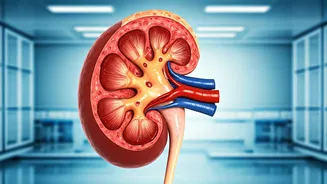Protein's Crucial Role
Protein, recognized as a fundamental macronutrient, is essential for numerous biological functions within the human body. It serves as a primary building
block for tissues, muscles, and organs, playing a crucial role in growth, repair, and overall structural integrity. Furthermore, proteins contribute significantly to enzymatic reactions, hormone production, and the transportation of vital molecules throughout the body. Enzymes, which are proteins, catalyze biochemical reactions necessary for metabolism and cellular processes, while hormones, also proteins, regulate various physiological functions such as growth, metabolism, and reproduction. The transport proteins help carry essential substances like oxygen, nutrients, and waste products across cell membranes and throughout the bloodstream. Consequently, protein intake must be adequate to support these essential functions, but excessive consumption may lead to adverse health effects. An adequate and balanced diet can ensure the fulfillment of the body's protein requirements.
Kidney Strain Unveiled
One of the primary concerns associated with excessive protein intake is the potential strain on the kidneys. These vital organs are responsible for filtering waste products and excess fluids from the blood, and when an individual consumes too much protein, the kidneys must work harder to process and eliminate the increased waste load. This heightened workload can potentially lead to kidney damage, especially for people with pre-existing kidney conditions. The increased production of urea, a byproduct of protein metabolism, can further challenge the kidneys. Over time, the constant strain may lead to kidney dysfunction or even failure. Therefore, understanding individual kidney health and consulting with healthcare professionals about protein intake levels becomes extremely important to prevent unnecessary harm and to maintain kidney health. Prioritizing moderate, balanced protein consumption alongside adequate hydration can assist in preserving kidney function and reducing potential risks.
Heart Health Concerns
Besides kidney-related issues, excess protein consumption can also indirectly affect cardiovascular health. While protein itself doesn’t directly harm the heart, the dietary choices often associated with high-protein diets can raise cholesterol levels and increase the risk of heart disease. Many high-protein diets emphasize consuming large quantities of animal products, which are typically high in saturated fats and cholesterol. Elevated levels of these fats in the bloodstream can contribute to the formation of plaque in the arteries, leading to atherosclerosis. Additionally, some high-protein diets may involve reduced intake of fruits, vegetables, and whole grains, thereby leading to fiber deficiency. A diet lacking in fiber can contribute to high cholesterol, which may contribute to cardiovascular issues. Therefore, adopting a balanced approach that focuses on lean protein sources, such as fish and poultry, alongside a varied diet full of essential nutrients, is essential for maintaining optimal cardiovascular health and reducing cardiac risk.
Digestive System Impacts
Excessive protein intake can sometimes result in unfavorable effects on the digestive system. High protein diets can lead to gastrointestinal distress, which can lead to uncomfortable symptoms like bloating, constipation, and diarrhea. The body may find it difficult to fully digest and absorb large amounts of protein quickly, resulting in these unpleasant side effects. Moreover, certain high-protein diets may contain very low fiber, which is crucial for healthy digestion and bowel regularity. Fiber promotes regular bowel movements, absorbs water, and assists the transit of food through the digestive tract. With insufficient fiber, the digestive process may be slowed, worsening constipation and discomfort. In addition, excessive protein intake can disrupt the balance of gut bacteria, as protein can feed unfavorable bacteria, leading to further digestive disturbances. Maintaining a well-balanced diet that includes adequate amounts of fiber and a variety of nutrients helps promote healthy digestion and gut health.
Bone Health Considerations
The relationship between high-protein diets and bone health is multifaceted and requires careful consideration. High protein intake can influence calcium balance in the body, which, in extreme situations, can lead to negative consequences for bone density. When the body digests protein, it produces acids that might potentially leach calcium from the bones to neutralize the acidity, thereby weakening the bone structure. However, this effect is often mitigated by an adequate intake of calcium and vitamin D, as these nutrients are essential for bone health. Some studies show that protein, particularly from animal sources, may increase the excretion of calcium in the urine. It’s important to note that the impact of protein on bone health varies depending on several factors, including the type of protein consumed, overall diet, and individual health conditions. For individuals concerned about bone health, it is essential to balance protein intake with sufficient calcium, vitamin D, and regular exercise to maintain bone density and overall skeletal health.
Optimal Protein Intake
Determining the right protein intake level is essential for health, as it varies depending on individual needs and health conditions. The recommended daily allowance (RDA) for protein is approximately 0.8 grams per kilogram of body weight for the average adult. This amount is sufficient to meet basic protein needs for individuals who are moderately active. However, those who engage in vigorous exercise, athletes, or individuals recovering from illness may need more protein to help support muscle repair and growth. Furthermore, it is important to consult a healthcare professional or a registered dietitian to determine the ideal protein intake based on individual needs and health status. They can evaluate factors such as body composition, activity levels, and overall dietary habits to provide personalized guidance. When consuming protein, focusing on various sources like lean meats, poultry, fish, beans, lentils, and nuts helps ensure a well-balanced intake of amino acids and other essential nutrients, and also minimizes potential health risks.
Balanced Diet Strategy
Adopting a balanced dietary approach is fundamental to maximizing health benefits while minimizing the potential downsides of excessive protein intake. A balanced diet should prioritize a variety of nutrient-rich foods that provide a wide range of essential nutrients, including proteins, carbohydrates, healthy fats, vitamins, and minerals. Emphasize lean protein sources like fish, poultry, beans, and lentils. Include fruits, vegetables, and whole grains to ensure adequate fiber intake, which is essential for digestive health. Make sure to choose healthy fats from sources like avocados, nuts, and olive oil, while limiting saturated and trans fats. Maintaining a balance of these elements helps ensure that the body gets all the nutrients it needs without overloading any single nutrient. Regularly consuming a variety of foods also helps prevent nutrient deficiencies and promotes overall health and well-being. Additionally, keeping hydrated by drinking enough water throughout the day is crucial for overall health.




















